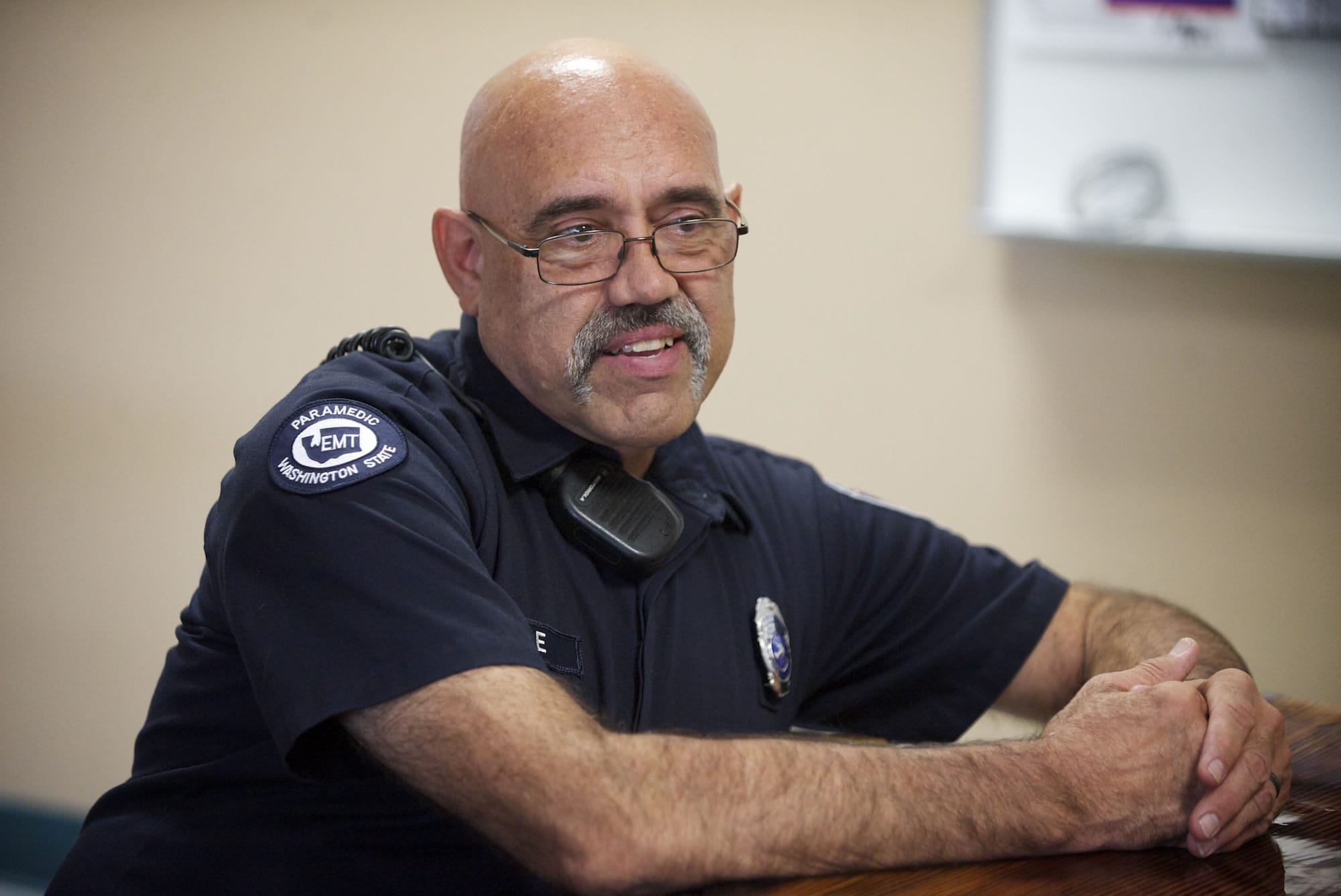BATTLE GROUND — After 40 years, George Lingle still has fire in his eyes.
At 56, he’s Clark County Fire & Rescue’s oldest firefighter/paramedic, on the line doing what people often dub a young man’s job. In downtown Battle Ground’s Station 27, he brushes elbows with men less than half his age.
“A typical firefighter averages 20 years of service,” said Battalion Chief Tim Dawdy. “If they’re extraordinary, they work 30 years. But George has been here 40 years, which makes him remarkable.”
Firefighting began as a family affair. Lingle’s father Richard, 73, founded Fire District 11 in 1961, and that eventually merged into Clark County Fire & Rescue. At 10 years old, George Lingle hung around the fire station and swept the apparatus bay after school on Mondays before the evening drills.
He became a volunteer firefighter in 1973 on his 16th birthday. The day before, he turned in all of the paperwork, including a signed waiver from his parents. A few months later, he went to the district’s first medical call.
At one point, there were eight Lingles fighting fires. After he and his two brothers married, their wives joined the whole family on the firetruck.
“The doors would open up and Lingles would pour out,” he said, with a laugh.
Despite his early entry into the fire service, getting on the line full time wasn’t easy. While a freshman in high school, he was diagnosed with a kidney disease that barred him from full-time work until 1994, four years after the passage of the Americans with Disabilities Act.
Physicians told him he would require dialysis at age 30, but the need arrived two years ahead of schedule.
In 1986, Lingle’s dad gave him one of his kidneys. The transplant worked fine until five years later when a drunken driver ran a red light and T-boned an ambulance in which Lingle was riding. He was tending to a patient when the vehicle was struck, throwing him forward into the cabinetry. His transplanted kidney failed and he underwent surgery, later suffering a post-surgical heart attack. He had another kidney transplant and later had angioplasty and a stent installed in his heart.
The surgery put him at greater risk for cancer, which later developed in his stomach. To cut out the cancerous tumor, physicians removed half of his stomach. Lingle said he’s had a clean bill of health since then, adding that it took him a while to stretch his stomach back out. His co-workers joke that Lingle will outlive them all.
Although some people felt that his medical history would prevent him from being a long-term firefighter, Lingle believes he proved them wrong. Being on the receiving end of emergency services also helped him empathize with the people he serves.
“I have been a patient often enough … I know how they want to be treated,” Lingle. “Almost always with respect and dignity.”
Lingle credits his longevity in a demanding profession to his spirituality. Through his faith, he believes everything has a purpose, and without that belief, he said, firefighting would be too draining.
“Tragedies are a blip in someone’s life,” he said, “not the end result.”
Tragic scenes
In four decades, he’s run toward many tragedies and seen people at their absolute worst.
He was the paramedic on call in the fall of 1989 when two brothers, ages 10 and 11, were murdered in Vancouver’s David Douglas park by serial child killer and molester Westley Allan Dodd. Both boys were stabbed to death.
“That was a difficult one,” Lingle said.
About five years later, he went to a medical call in Battle Ground. A 6-year-old girl who had recently had a tonsillectomy got an infection in her throat that caused the artery attached to the tonsils to rupture. She woke up in the middle of the night and couldn’t breath. As she tried to tell her parents, blood came out of her mouth.
By the time the crew arrived, the little blonde girl was lying in a pool of her own blood and all of her blood vessels had collapsed. Paramedics put her on an IV and performed CPR as they headed toward the hospital. She flat-lined. Those in the ambulance were debating what to do next because they didn’t think she would survive the trip.
Lingle watched as the ECG monitor spiked back to life. They had done just enough to bring her back from the brink. The call tugged at his heartstrings because his 6-year-old daughter looked a lot like the girl he helped save.
“We look at it and say ‘if it were mine,'” Lingle said.
The girl survived but is severely disabled.
Another call left him in tears. During a backyard birthday celebration the party moved to the front of the house. The group realized one of the young boys was missing and found him floating in the pool. Arriving paramedics found the boy difficult to intubate, a procedure where a tube is placed into the windpipe to secure the airway. They turned to Lingle, considered an expert at intubating. After several tries, he finally got the tube inside using a procedure for which he had never been trained.
But the boy, who was dead when they arrived, could not be revived.
“Even though everyone turns to me, I couldn’t do it,” Lingle said. “I felt like I should have gotten it right away.”
Four babies
Although, those calls are seared into his memory, his work is far from joyless.
Over his career he’s delivered four babies — two in an ambulance and two in the fire engine bay. (Or as he calls it, the “B.G. Birth Center.”)
Lingle looks forward to being part of the fire crew on standby during high school games at District Stadium in Battle Ground. There, the crew talks with people going to the game. For him, being a firefighter/paramedic is about the daily contact with people.
That explains why, with his seniority, he hasn’t tried to move up the ladder, so to speak. He’s younger than Chief Dennis Mason but has three years of additional service in the district.
“I don’t think I ever want off an engine,” Lingle said.
He’s studying to become a captain, a higher position that keeps him on the line but shifts him into a larger leadership role. His senior status already makes him the first officer when the captain isn’t around. If he stays a firefighter/paramedic until he retires, then he’ll retire a happy man.
“I’m not in it for the money,” he said.
Just don’t expect him to bow out anytime soon. Although firefighters in Washington are eligible for retirement at 53, Lingle says he will probably retire by age 70. Probably.
Right now, he’s too excited about the future of the fire service to think of leaving. During his career, the fire service added medical calls, there were advances in emergency field medicine, and firefighters got involved in public outreach.
He predicts the fire district will become an all-risk agency that promotes public education, injury prevention and works with at-risk children.
Going home
After describing his career from inside his office at Station 27, Lingle took a pause and said, “I want to show you something.”
He walked into the bay where the fire engine was parked, and he pointed to the glass and metal door. White letters that are faint against the aluminum read: “Everyone goes home.”
You might not notice the message unless you were either looking for it or, like Lingle does every 24-hour shift, you were climbing into the driver’s seat of the fire engine.
His yellow helmet sits in the windshield of the rig, directly across from those words — what Lingle calls a mantra for an enduring, healthy career in the fire service.
Outside of the fire station, the crew has a responsibility to be there for their families.
“If I don’t make it home, I don’t meet that responsibility,” he said.
It’s about taking calculated risks.
Lingle puts his life on the line for other people, but he’s not going to put himself in danger to save property. The way he sees it, when he finishes his career, he needs to be able to enjoy retirement with his wife, his eight kids and his grandchildren.
That means work hard and save lives — but also take care of your own.
On Oct. 19, the day before his 56th birthday — 40 years to the date that a fateful pile of paperwork set his career in motion — he sailed the Columbia River with his family. They went upstream in his 27-foot sailboat from Kadow’s Marina and stopped at the Red Lion Inn at the Quay for dinner.
And then, he went home.




